This week in the U.S. House of Representatives, Senate: Apr. 25 — 29, 2016
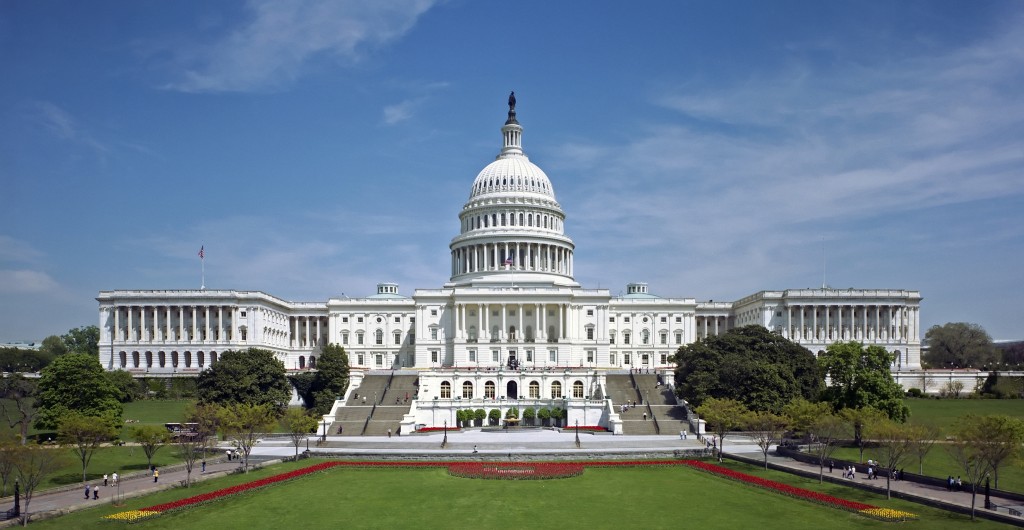
Both chambers are in session this week and are scheduled to adjourn at week’s end for a one-week district work period. U.S. House of Representatives On Monday, the House meets in pro forma session. On Tuesday, the House is in session and will consider several bills under Suspension of the Rules including: H.R. 1684: the Foreign Spill Protection Act. This bill would allow the federal government to recover the costs for oil spill cleanup activities from foreign entities owning or operating offshore facilities located further out to sea than the boundary of the exclusive economic zone (200 miles) of the United States H.R. 4698: the Securing Aviation from Foreign Entry Points and Guarding Airports Through Enhanced Security Act. This bill seeks to strengthen security screening at foreign airports that have non-stop flights to the U.S. H.R. 3583: the PREPARE Act. This bill includes numerous provisions intended to improve the Homeland Security Department’s and Federal Emergency Management Administration’s (FEMA) emergency preparedness and response programs and activities. A full list of bills that will be considered under suspension can be found here. Also on the House floor this week: H.R. 4901: the Scholarships for Opportunity and Results (SOAR) Reauthorization Act. The bill reauthorizes for five years, through FY 2021, the Scholarships for Opportunity and Results (SOAR) program, under which federal funding is provided to eligible students in Washington, D.C., to allow them to attend private schools, and it modifies the program to provide for greater student participation and to mandate greater accountability by the private schools that participate in the program. Alabama co-sponsor(s): None H. J. Res. 88: a joint resolution to disapprove of the Labor Department’s Fiduciary Rule. The resolution disapproves the rule issued by the Labor Department on April 8, 2016, commonly known as the fiduciary rule on retirement investment advice, that subjects broker-dealers who oversee retirement investments to the fiduciary standard, under which they must provide investment advice that is in the best interest of the investor “without regard to the financial or other interests” of the financial institution, adviser, or other party. Alabama co-sponsor(s): Rep. Bradley Byrne (AL-01) Highlights of what is happening in House Committees this week: Budget season: The House Appropriations Committee continues its FY17 hearing slate, a full list of those hearings can be found here. NDAA: On Wednesday, the House Armed Services Committee will markup the annual National Defense Authorization Act (NDAA). More information can be found here. E&C markups: The House Energy & Commerce Committee will hold multiple markups this week. More information is available here. TSA oversight: On Wednesday, the House Oversight and Government Reform Committee will hold a hearing titled “Examining Management Practices and Misconduct at TSA.” More information here. Small businesses: On Wednesday, the House Small Business Committee will hold a hearing titled “S is for Savings: Pro-Growth Benefits of Employee-Owned S Corporations.” More information here. Homeland security oversight: On Thursday, the House Oversight and Government Reform Committee will hold a hearing titled “Criminal Aliens Released by the Department of Homeland Security.” More information here. EPA and Pebble Mine: On Thursday, the House Science, Space and Technology Committee will hold a hearing titled “Examining EPA’s Predetermined Efforts to Block the Pebble Mine, Part II.” More information here. Asia: On Thursday, the House Foreign Affairs Committee will hold a hearing titled “America as a Pacific Power: Challenges and Opportunities in Asia.” More information here. U.S. Senate The Senate is in session and expected to continue consideration of its FY17 Energy and Water appropriations legislation. Highlights of what is happening in Senate Committees this week: F-35 Joint Strike Fighter program: On Tuesday, the Senate Armed Services Committee will hold a hearing to examine the F-35 Joint Strike Fighter program in review of the Defense Authorization Request for fiscal year 2017 and the Future Years Defense Program. More information here. China: On Wednesday, the Senate Foreign Relations Committee will hold a hearing to examine United States-China relations, focusing on strategic challenges and opportunities. More information here. Small business regulations: On Wednesday, the Small Business and Entrepreneurship Committee will hold a hearing to examine the controversial waters of the United States rule and the case for reforming the Renewable Fuels Association. More information here. ISIL: On Thursday, the Armed Services Committee will hold a hearing to examine counter-ISIL (Islamic State of Iraq and the Levant) operations and Middle East strategy. More information here.
Lynn Greer & Katherine Robertson: The fight for pension reform in Alabama

Like many pension funds across the country, the State of Alabama’s public pension system faces significant funding challenges. Alabama’s pension costs have doubled over the last ten years, despite the fact that the legislature has never missed paying the steadily increasing annual required contribution. In the past, this payment was made with little fanfare, but ongoing budgetary woes have demanded a higher degree of scrutiny. Last year, in the face of a $200 million shortfall for the state’s general fund, every program or service was on the chopping block. Alabama’s Republican governor tried to raise over $500 million in new taxes, but vehement opposition from the general public left the proposal dead on arrival. Without new revenue, the Alabama Legislature spent nearly seven months struggling to cut its way to a balanced budget. State parks and driver’s license offices were closed, road projects were threatened, and law enforcement offices braced for layoffs. All the while, Alabama’s public pension system received nearly $1 billion from taxpayers. While state leaders have begun to pay more attention, Alabama’s taxpayers have not yet come to grips with the high cost of the state’s public pensions. The haze of misinformation surrounding the debate often obscures the reality: the state has at least a $15 billion funding gap that will not be closed until 2050, at the earliest. Over the next twenty-five years, the projected amount of the state’s yearly contribution–the cost of paying for new benefits earned and a portion of the existing unfunded liability–as presented on a bar graph looks like a steep staircase, topping out at over $2 billion in 2044. That staircase only leads to full funding by 2050 if the state does not accrue any additional unfunded liabilities between now and then. To avoid amassing any new debt, the system will have to steadily hit its 8 percent target investment return. If the S&P 500 is any indication — it is down by .48 percent over the last year and up only 4.9 percent over the last ten years — this will be a difficult task. A recent report from the PEW Charitable Trusts estimates that if Alabama’s pension investments return 6.25 percent rather than 8 percent over the next 40 years, Alabama’s funded ratio would dip below 60 percent while the annual contribution would top out at $5 billion around 2050. By comparison, Alabama only collects around $10 billion per year in state taxes. Still, plan administrators maintain that 8 percent is an appropriate assumption and that present underfunding will work itself out. As evidence, they cite average returns of 8 percent or better over the last 30 or 35 years. But past performance doesn’t guarantee future results, nor do average returns tell the whole story, since the state accumulated massive unfunded liabilities during the same time period. Volatility is the curse of traditional defined benefit pension plans–and that’s the foundational problem for many states, including Alabama. Even if investments return 8 percent or better on average, just one down year (especially if during an early year) can substantially impact the plan’s funding level and take years to recover from. Down years can also lead to risky investments. The more that pension investors stretch to achieve higher returns, the higher the risk of generating additional unfunded liabilities. In spite of these sobering facts, pension reform in Alabama faces an uphill battle. In Montgomery, lawmakers are bombarded with thinly veiled threats from groups and associations who don’t want anyone to “touch their pensions.” Representatives of the public pension system insist that nothing needs to change. Every academic from inside or outside the state who has dared to question the shaky trajectory of Alabama’s pensions has been publicly maligned. The few politicians who have shown a willingness to lean into the problem have been vilified in newspapers and accused of trying to “raid the retirement system.” As is often the case, the groups fighting pension reform in Alabama represent the very individuals who will be badly hurt if the state cannot keep its promises. Though it may not be an easy lift politically, state leaders have a duty to ensure a solvent pension system for public employees and retirees. They also have a duty to protect future generations of Alabamians from inheriting a fiscal catastrophe. Will taxpayers be willing to double their investment–or even, according to some projections, triple or quadruple their investment–in the pension plans of state employees and retirees, pension plans that are likely better than their own? Should they be asked to do so? The people who will be called upon to either pay up or go without certain government services may not be the constituents of current politicians, but they will be their children and grandchildren. One thing is certain: pension reform will come to Alabama. Responsible reforms can be adopted now, or the state will be forced to make hasty, draconian changes during the next severe economic downturn. The involuntary, reactive option will present a much uglier scenario for retirees, taxpayers, and politicians alike. • • • Lynn Greer represents District 2 in the Alabama House of Representatives and co-chairs the legislature’s Joint Committee on Public Pensions. Katherine Green Robertson is Vice President for the Alabama Policy Institute (API). API is an independent, nonpartisan, nonprofit research and educational organization dedicated to the preservation of free markets, limited government, and strong families.
Jim Zeigler hoping for public showdown with Robert Bentley over ethics violations
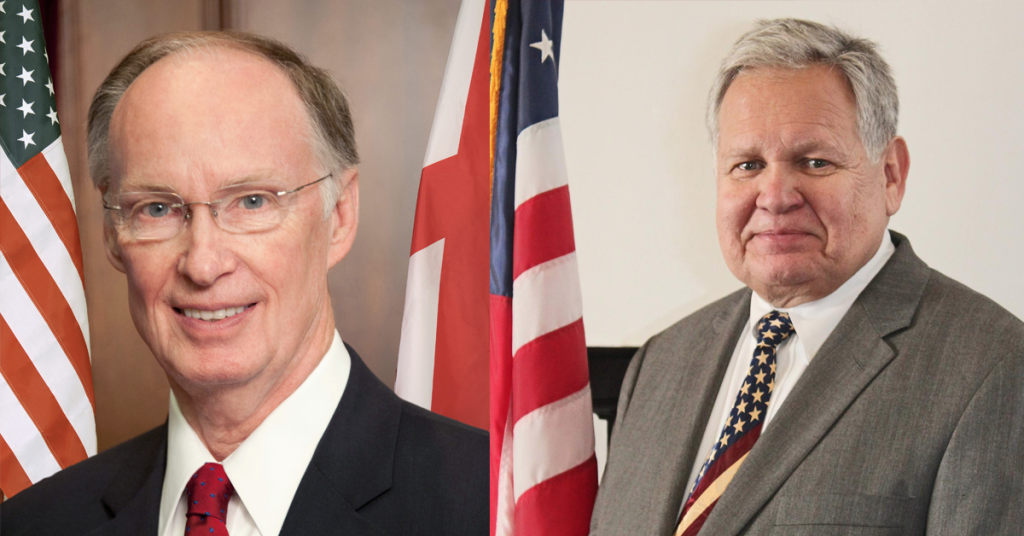
On May 2, State Auditor Jim Zeigler “will be in my office at 10 a.m. with a court reporter, and a Bible to swear in the Governor.” Zeigler plans to grill Gov. Robert Bentley about accusations the governor misused public resources during an affair with a former adviser, the recently dismissed Rebekah Mason. On Monday Zeigler upped the stakes yet again, saying state law allows — indeed requires — the entire State Auditor’s probe to be open to the press and the public. Zeigler initially announced he would take Bentley’s testimony behind closed doors, presumably to spare the governor a modicum of disgrace. But after conducting some legal research, Zeigler said, the investigation is subject to open-government laws and must be done in full view of the public. “It is the public’s business, and we will allow news media and citizens to attend,” said Zeigler. Bentley, for his part, does not appear likely to show up. The governor has mostly ignored Zeigler’s request for an appearance in his office at the Capitol, though he did issue the following: “The appropriate legal process is through the Alabama Ethics Commission where the Auditor has already filed a complaint, and we are fully cooperating in every way,” said Bentley. “I do not intend to respond further to Mr. Zeigler.” The standoff is the latest in a series of jousting matches between the two fellow Republican members of the state’s executive branch. Bentley is supporting a bill this Legislative Session that would grant the governor power to appoint the State Auditor, revoking the office’s status as an elected position. Zeigler, in turn, has proposed an “executive recall” mechanism that would allow for Bentley to be removed from office via a petition signed by 10 percent of registered voters. In the meantime, Zeigler’s May 2 deadline hangs over the Zeigler-Bentley feud like the sword of Damocles. Zeigler says Code of Alabama statute, 36-16-2, authorizes his office to require just the kind of inquest into Bentley he is seeking. It reads: “The Auditor has authority to require information on oath, to be administered by him, from any person touching any claim or account he is required to audit.” While that seems to leave little room for interpretation, Bentley remains highly unlikely to fulfill Zeigler’s request to appear. Zeigler says he is looking into options regarding enforcement, and will pursue punitive measures should Bentley defy his order. “We will take action after May 2 if the order is not complied with. Since I set the May 2 date and time for compliance, I cannot do anything until that time has passed,” said Zeigler.
Alabama pols react to former Chief Justice Perry Hooper’s passing
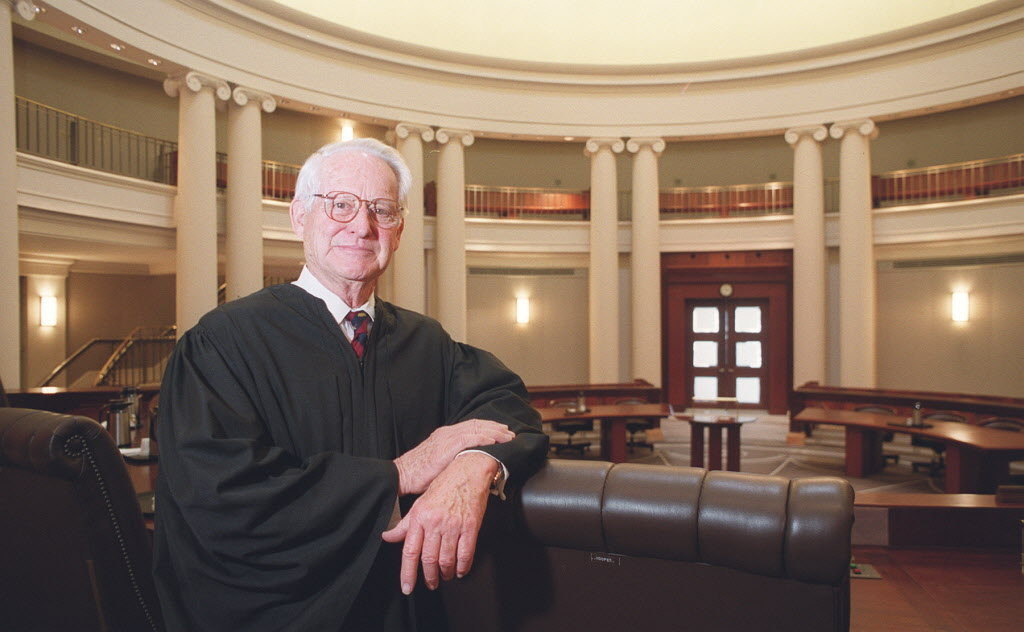
Former Chief Justice of the Alabama Supreme Court Perry Hooper, Sr. died on Monday at the age of 91. Hooper’s passing leaft a void in the hearts of many around the Yellowhammer State who remembered him for his thoughtful, gentlemanly approach to Alabama’s most pressing legal problems, admirers of the late jurist said. “I am saddened to hear of the passing of former Chief Justice Perry Hooper Sr. today,” said Gov. Robert Bentley. “Chief Justice Hooper was the first Republican Chief Justice to be elected since Reconstruction, and he served our citizens with honesty and integrity during his time on the Supreme Court.” “He was a role model for many Republicans and valued public service. He was a Marine veteran and a strong family man. I know Alabamians join me in praying for his family, especially his wife Marilyn and their children, during this time,” said Bentley. Perhaps Hooper’s most significant legacy stems from his historic challenge to incumbent Chief Justice E.C. “Sonny” Hornsby in 1994. Hooper ousted Hornsby, a Democrat, and led the way for a sea change on the high court which saw all of the Democrats replaced by GOP judges within 10 years. The election resulted in an eleven-month ordeal involving recounts, extensive litigation, and heated legal argument in a Mobile court over thousands of absentee ballots later thrown out by a federal judge. “Throughout that litigation Chief Justice Hooper served as a model of quiet dignity and class,” said Bill Pryor, a federal judge and former Alabama attorney general, in a statement. Former Gov. Fob James, who swore Hooper in 1995 after he prevailed in a legal battle with massive ramifications from Alabama politics, called the late justice “a wonderful example for judges and public servants to know the law.” “He knew the law,” said James. “And he was absolutely fearless in doing upfront what was right.” State Auditor Jim Zeigler also put out a statement after Hooper’s passing. “An Abundant Life: Judge Perry Hooper Sr. Saying goodbye to a chapter of Alabama historic, a Southern gentleman, a founder of the Alabama Republican Party, and an All-American family man,” said Zeigler. “Court is adjourned.” Hooper’s son, Rep. Perry Hooper, Jr., currently serves in the Alabama House.
Darryl Paulson: Candidate’s running mate rarely affects outcome of presidential election
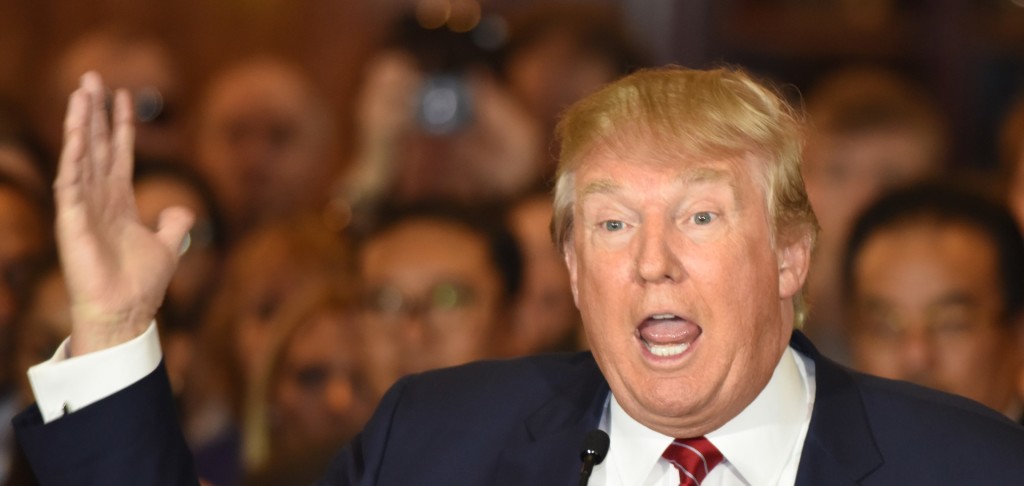
The national conventions are less than three months away and, as the nomination phase comes to a close, attention will gravitate toward potential vice presidential candidates. Let’s focus on the factors that have been used in selecting vice presidents. Most conventional wisdom is wrong. To begin with, most people and many presidential candidates select a vice president who they believe will help them win the election. Few vice presidents have had any effect on the election results. Jack Kemp did not help carry his home state for Bob Dole and Paul Ryan did not win Wisconsin for Mitt Romney. On the Democratic side, Sen. Lloyd Bentsen was not able to carry Texas for Michael Dukakis, nor did John Edwards help the Democrats win South Carolina or other southern states. One of the few times a vice president actually helped a president carry a state was in 1960 when John F. Kennedy picked Sen. Lyndon Johnson as his running mate. If Kennedy had not won Texas, Richard Nixon would have won the presidency. In like fashion, vice presidents are sometimes selected to provide regional balance, although there is no evidence that this helps. When Bill Clinton of Arkansas picked fellow southerner Al Gore as his vice president, many thought this unbalanced regional ticket was crazy. When the Clinton-Gore team captured the electoral vote of four southern states, something that Democrats had been unable to do in recent presidential elections, Clinton’s choice looked like genius. In addition to regional balance, vice presidents are sometimes selected to provide ideological balance. With increased polarization in recent years, this is becoming a less important factor. In 1976, Ronald Reagan announced Sen. Richard Schweiker of Pennsylvania as his vice presidential choice prior to the convention. Reagan hoped to alleviate the fears of some that he was too conservative and needed a moderate to balance the ticket. More importantly, Reagan hoped that picking Schweiker would convince some Pennsylvania delegates to support his candidacy over incumbent Gerald Ford. The pick of Schweiker did not help Reagan and Ford went on to win the nomination. Many Democrats in 2016 see Hillary Clinton as too conservative and too establishment and have urged her to choose a progressive as vice president. In addition to Bernie Sanders, other progressive names being floated are Sen. Sherrod Brown of Ohio and Sen. Elizabeth Warren of Massachusetts. A vice president is sometimes selected to stimulate participation by a particular group. Walter Mondale selected Geraldine Ferraro to get more women to vote. That pick didn’t provide much help. Mondale won only his home state of Minnesota and the District of Columbia against Reagan. Vice presidents have been picked to add gravitas to the ticket. Concerns about Reagan’s limited government experience led him to pick George Herbert Walker Bush as his vice president. Bush had been a member of Congress, the U.S. ambassador to the United Nations and to China, head of the Republican National Committee and head of the CIA prior to his selection. Bush’s son, George W., picked Dick Cheney as his vice president to add heft to his ticket. Cheney had served as Chief-of-Staff to Ford, been a member of the House, and served as Secretary of Defense for George W’s father. In fact, Cheney headed George W’s vice presidential selection team and concluded he was the best candidate. Do any of these factors help a presidential candidate win? The answer is no. A study by two political scientists, Bernard Grofman and Reuben Kline, analyzed 11 presidential elections between 1968 and 2008 and found the net effect of a vice president was 1 percent at most. If Clinton is the Democratic nominee, she may pick a progressive or choose someone like Secretary of Housing and Urban Development Julian Castro. Although not well known, Castro’s youth and Hispanic background might help stimulate Hispanic turnout. If Trump is the GOP nominee, it is easier to put together a list of people he would not select than those he would. There is little chance that “lying Ted,” “little Marco,” or “low energy Bush” would want to join forces with Trump. Gov. Scott Walker of Wisconsin is one possibility since he dropped out of the nomination race early before Trump had the opportunity to insult him. Chris Christie is another option because he was the first major candidate to endorse Trump after Christie withdrew. Another option is Florida Gov. Rick Scott. Florida is a “must win” state and Scott endorsed Trump as a “businessman outsider who will shake up the status quo in Washington.” Although most of the factors in the vice presidential selection process have been shown to have little impact, there are two general rules that no president should ignore. First, pick someone you feel comfortable working with. Second, and most important, pick someone who is ready to be president. Nothing else matters. *** Darryl Paulson is Professor Emeritus of Government at USF St. Petersburg.
Presidential Primary Brief: 196 days until Election Day
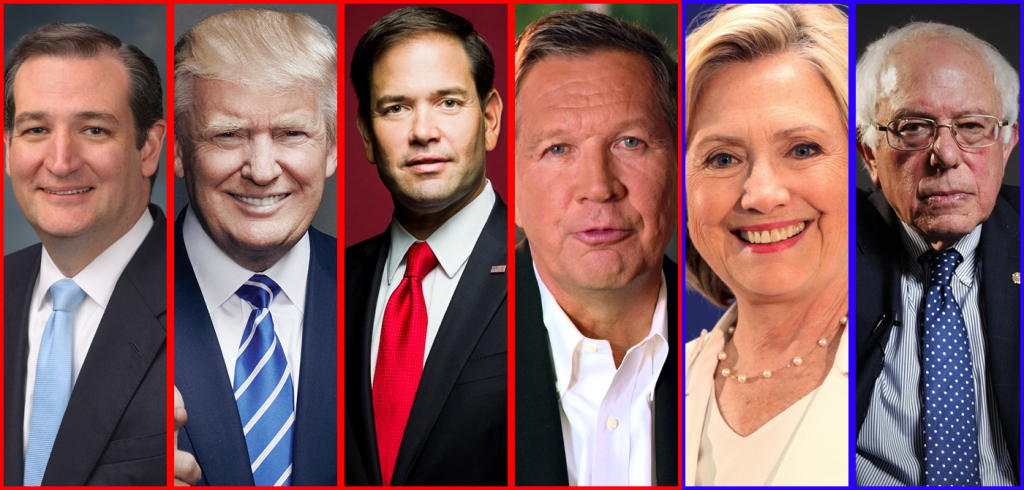
196 days until Election Day Convention Dates: Republican July 18-21 2016, Democratic July 25-28 2016 Weekly Headlines: Trump, Clinton Build Momentum With Double-Digit Leads in Pennsylvania Bernie Sanders offends some with comments about South Ted Cruz, John Kasich join forces to stop Donald Trump Press Clips: What Are Kids Learning From This Presidential Election? (NPR 4/19/16) Third-grader Victor Reza was watching CNN in the living room in Houston with his family when Donald Trump was announced as the winner of the Florida Republican primary. Victor teared up, his older sister, Maria, said in a telephone interview. “I don’t want him to win,” he announced. “If he wins, I’m never going to see any of you again.” Victor, 10, is a U.S. citizen, but members of his immediate family are not. And, says 21-year-old Maria, “I’m pretty sure he’s heard hateful rhetoric from his classmates at school. His friends at school were saying, ‘Ha-ha, your family’s going to be deported now because Donald Trump is going to win.’ “ Here’s a look at the 2016 race by the numbers (Huffington Post 4/21/16) It’s official: The 2016 presidential election is already a 10-figure affair. Household names such as Hillary Clinton, Bernie Sanders, Donald Trump and Ted Cruz account for much of this spending. But a gaggle of obscure and moneyed super PACs have likewise helped rocket campaign expenditures to mesospheric levels — ones unthinkable even four years ago. Here’s a rundown of the more telling — and curious — statistics to emerge from a new round of political campaign disclosures. Underdog presidential candidates spend heavily to catch up (St. Louis Post 4/20/16) Democratic presidential hopeful Bernie Sanders continued to outpace rival Hillary Clinton in fundraising — and spending — last month, new Federal Election Commission Filings show. Sanders’ record March haul of almost $46 million topped Clinton by about $19 million. Yet he vaporized that cash advantage by spending roughly $17 million more than she did. Sanders shared the numbers on his campaign website, but his report wasn’t available through the FEC by early Thursday. While racking up wins in recent primary states, except New York this week, Sanders has failed to nudge Clinton off her apparent path to the party’s presidential nomination. Hillary Clinton ignores Bernie Sanders, focuses fire on GOP candidates (LA Times 4/24/16) Hillary Clinton campaigned Sunday as though she were already the Democratic nominee, ignoring rival Bernie Sanders and focusing her Fire only on the Republican Yield. After outlining her priorities – raising the minimum wage, equal pay, improving Obamacare, increasing gun regulations, criminal justice reform – Clinton turned to GOP candidates Donald Trump and Sen. Ted Cruz. “I hope you have paid attention to what the Republicans running for president have been saying, because everything I have just said, they disagree with,” she said. Clinton said people are often shocked by Trump’s incendiary statements. Bernie Sanders addresses thousands in Providence (Providence Journal 4/24/16) The crowds are out early for Bernie Sanders in Providence. By 10 a.m., some 2,000 people had already arrived at Roger Williams Park, according to Journal Staff Writer Linda Borg. The Vermont senator’s rally is due to officially start at noon. The early arrivals were treated to Neil Young’s classic “Rockin’ in the Free World” and other pro-change music from the 1960s and 1970s at the Temple to Music. The ‘nasty effect’ and why Donald Trump supporters mistrust the media (Washington Post 4/24/16) Donald Trump supporters and the mainstream media have a well-practiced routine that goes like this: The media report that the Republican presidential front-runner said or did something untrue/offensive/dangerous, and then supporters reject the reports as dishonest/exaggerated/insignificant. Which leads to the confounding question for journalists: Why does critical coverage of Trump have no effect on his loyalists? Wait. Scratch that. There is an effect — it arguably makes them more loyal, not less. But if that’s the case, then why does critical coverage have a reverse effect? Ted Cruz back in Indiana Saturday for Lebanon rally (Indy Star 4/23/16) Republican presidential contender Ted Cruz will be back in Indiana on Saturday as part of his effort to block front-runner Donald Trump from winning the GOP nomination outright. The U.S. senator from Texas will stop at the Oasis Diner in Plainfield at 3:30 p.m., then host a rally at the Boone County Fairground’s Witham Pavilion in Lebanon at 6 p.m. It will be Cruz’s second Indiana stop in three days and signifies just how important the Hoosier state is to his strategy. Cruz is trying to prevent Trump from winning the required 1.237 delegates he needs to lock up the party’s nomination. He views Indiana’s May 3 primary — with 57 delegates up for grabs — as an essential part of that effort.
Just when you thought the Mason-Bentley scandal couldn’t get worse, it does
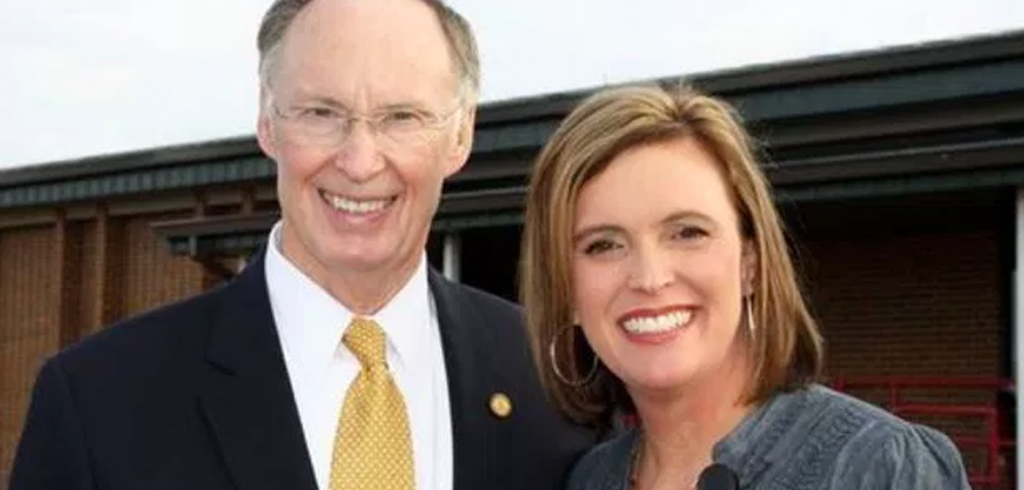
Watching the implosion around the Rebekah Mason – Robert Bentley scandal, one can’t help but think every time there’s another development, “How much worse could this get?” Because, inevitably, it does get worse. This doesn’t even refer to the relationship itself, which short of crimes being committed, is between the individuals, their families and their God. I’m talking about the horrible bumbling and fumbling of the facts and scandal itself. Mason’s husband, Jon Mason, wrote in a statement posted to his Facebook page on March 28, “I wanted to share that I long ago resolved the personal issue playing out now for everyone this week. Please continue to support families, the governor, and our state with prayers as we all move forward.” The audio recordings of Bentley speaking to Mason, much to the dismay of those who heard or read the transcripts, left little question that they had more than an emotional affair. A few too many references to touching, kissing, holding, etc. for it to be a platonic situation. Here’s my thoughts on the Top 5 public relations/crisis communication mistakes, in no particular order because they’re just all that bad: Not getting ahead of the scandal: With the known existence of audio tapes (that were two years old), ongoing rumors, and the number of individuals with first-hand knowledge, it would seem that the Governor and Mason had plenty of time to formulate a plan for when (not if) the relationship came to light. Only the parties involved know when it started though the Governor says he’s loved her for years in one of the audio recordings exclusively provided to YH News. Mason’s employment: I can’t for the life of me understand why Mason did not resign before the story broke and insisted on continuing to travel with the Governor one-on-one after the initial allegations surfaced during the Bentley divorce. The latest news broke this week, by the Montgomery Advertiser, that the Governor took Mason to a White House dinner in February of this year. This would be after his divorce, after her husband knew about the “inappropriate relationship.” When she finally did resign her statement was spot on leaving the question why didn’t she just do that sooner? The Governor’s press conference: I thought the Anthony Wiener press conference or maybe the Mark Sanford press conference would go down as the worst in political history in terms of unprepared, not well thought out statements but then Bentley opened his mouth. Where he made multiple statements that still boggle the mind such as, “I accept full responsibility. I want everyone to know though that I have never had a physical affair with Mrs. Mason.” (Despite describing touching her on the recorded call.) He went on to explain what he was apologizing for, “I’m apologizing for the things that I’ve said.” Umm. What? My favorite statement of the whole thing, “I love many members members of my staff. In fact all of the members of my staff…do I love …some more than others, absolutely.” Mason’s horrible statement: Following the Governor’s train wreck of a press conference, which you can watch below. Mason sent out a horrible, horrible statement citing gender bias as the reason for the reason she was being targeted. I planned to write a post about at that time but Katherine Robertson, from API beat me to it and nailed it. Robertson said, “Knowing the evidence that was now available to the public, Mrs. Mason did not deny anything, but in a desperate diversion, tried to claim that her gender was to blame for her present predicament.” She went on to say, “The statement released yesterday will not be soon forgotten by women who have actually struggled with inequitable treatment in their professions. Rather than expressing remorse, which the public would likely sympathize with, Mrs. Mason chose to cry wolf and play the gender card. As a result, whatever gender bias previously existed in Montgomery has just been dialed up a notch.” Because Mason called gender bias so early on and so haphazardly she couldn’t even point to it when it was occurring, as it just did with the misleading headline about her attending a concert with other staffers in Vegas. Denying the nature of the relationship: This one is the strangest. The Governor apologized for what was recorded. Mason dodged the relationship discussions all together. The recording and witness statements are pretty convincing yet there’s still an effort to stonewall. During the press conference the Governor as asked directly if his relationship with Mason was romantic and he ignored the question. It makes no sense to give a half apology. To accept responsibility for talking about physical acts but not the acts themselves. Rather than saying “I’m not going to address specifics of the relationship.” why say “There was no physical” relationship? I’m reminded of the old saying “The first rule of thumb when you find yourself in a hole is stop digging.” Bentley and Mason just keep digging and it’s made this story go from one news cycle to the next and next and next. It has reporters and bloggers alike on a hunt to unearth additional evidence and information to supplement what’s been said so far. There are currently a number of things happening surrounding this situation from impeachment discussions to recall laws being considered. I don’t expect the news to stop covering every little detail that is discovered. I don’t believe the calls for resignation will stop growing. I’m just hoping that the Governor and Mrs. Mason can get all their ducks in a row and facilitate this side show ending ASAP. Here you can find a list of those who have called on the Governor to resign so far. Video via KRG News 5:
Bill to regulate payday lenders inches closer to final passage

As the clock winds down on the Alabama Legislature’s 2016 Regular Session, a bill to regulate payday lenders which started with a great deal of momentum is now inching itself toward the finish line, despite broad support from both sides of the aisle in Montgomery. SB91, sponsored in the Alabama Senate by powerful senator and committee chairman Arthur Orr (R-Decatur), and carried in the House by Sophomore member David Faulkner (R-Mountain Brook) would cap maximum annual interest on payday loans at 180 percent, down from current interest rates of 456 percent per year. The bill passed the Alabama Senate nearly unanimously, garnering merely a single No vote. While supporters of the bill believe they have the votes in the House, the bill is meeting some resistance on its way to final passage. At a roundtable discussion held on April 18th by the Junior League of Birmingham, Rep. Faulkner said his primary goal is to get the bill, which he admits isn’t perfect but is a step in the right direction, out of committee and out of the House without any changes. The bill did not receive a vote after a lengthy public hearing during last week’s Financial Services Committee meeting, during which members heard from advocates on both sides of the issue. The reform being championed by two Republicans is somewhat of an anomaly, as such changes have frequently been carried by Democrats in other states. But Faulkner told Alabama Today it was a no brainer for him as soon as the lenders’ tactics were explained to him. “When the issue was explained to me by a member of my church I just knew it was the right thing to do,” said Faulkner. “I see these places all over the place, I’ve heard the stories, once I learned more about it, I felt like this was usury, and that the State of Alabama is wrong for having a system in place that really allowed people to be preyed upon. I’m a less government, small government conservative, but I don’t believe when the government put in place a system that allows people to be preyed upon, I felt like that was wrong.” A database created by the Alabama Department of Banking found Alabamians took out 462,209 loans over a 10-week period. A total of $146 million was borrowed, or an average of about $14 million each week. A coalition of activists from across the state have fought for years to bring this reform to the table. The Alliance for Responsible Lending in Alabama (ARLA) has members from the Arise Citizens’ Policy Project, Alabama Appleseed, the Alabama State Conference of the NAACP, the Alabama Citizens’ Action Program, the Southern Poverty Law Center, and the Federation of Republican Women. The group argues it has the deck stacked against them, with a well-funded special interest bolstering the bill’s opposition. A report by AL.com’s Kyle Whitmire found during the 2014 election cycle lenders gave more than $475,000, including $37.835 to House Speaker Mike Hubbard (R-Auburn) and thousands more to other influential members of the House and Senate. While opponents of reform say such loans are sometimes necessary to help low-income families through tough times, ARLA policy analyst Stephen Stetson wrote in an op-ed last month that what can appear to be a helping hand for those in need can be an “anchor” holding them in a cycle of poverty. “We all want a world where people can get the kinds of credit they need. But that requires putting some brakes on a system that all too often acts as an engine for poverty, handing out extremely high-cost loans to desperate folks who may treat them as a lifeline. Too often, those ‘lifelines’ instead end up as anchors, dragging people into financial quicksand.” With only two weeks left in the session, the bill’s advocates have precious few days to shepherd it through the rest of the legislative process and onto the governor’s desk.
Donald Trump bristles at Ted Cruz-John Kasich collaboration
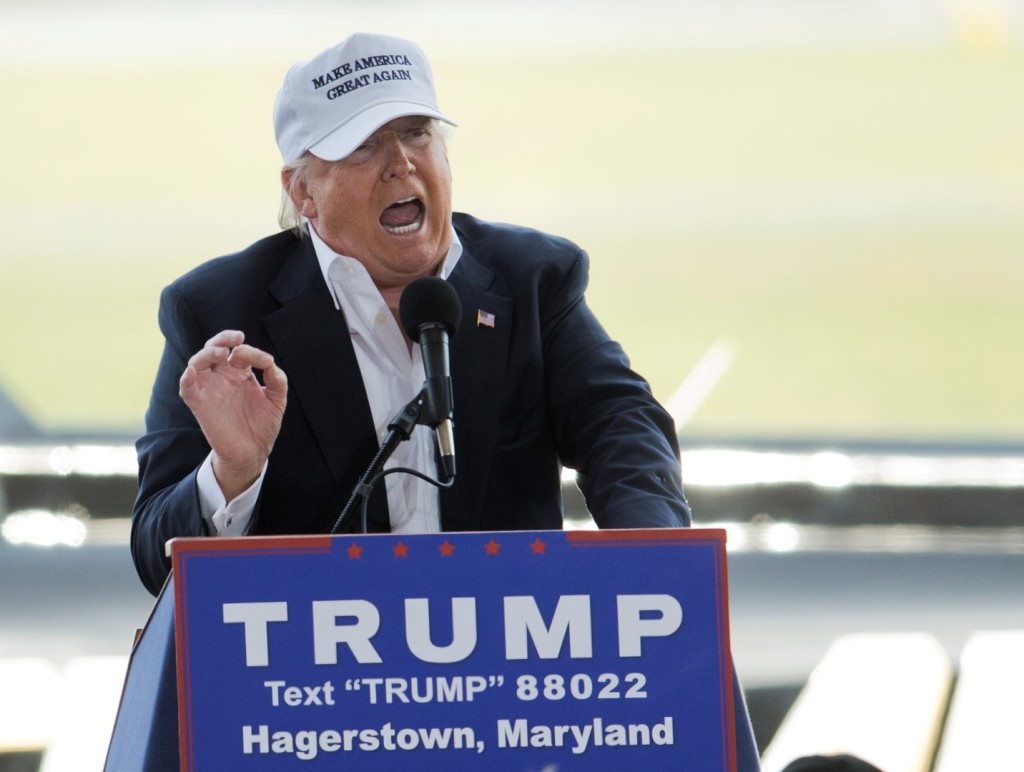
Donald Trump says an extraordinary collaboration between Ted Cruz and John Kasich aimed at unifying the anti-Trump vote in some remaining primaries is a desperate move by “mathematically dead” rivals. Such collusion would be illegal in many industries, the Republican presidential front-runner said, but it’s illustrative of “everything that is wrong in Washington and our political system.” Under the arrangement outlined Sunday, Kasich, the Ohio governor, will step back in the May 3 Indiana contest to let Cruz bid for voters who don’t like Trump. Cruz, a Texas senator, will do the same for Kasich in Oregon and New Mexico. The arrangement does not address the five Northeastern states set to vote Tuesday, where Trump is expected to add to his already overwhelming delegate lead. Yet the shift offers increasingly desperate Trump foes a glimmer of hope in their long and frustrating fight to halt the billionaire’s rise. Trump said in a statement the Cruz-Kasich compact joins two “puppets of donors and special interests” who have no path to the nomination. Cruz’s campaign manager, Jeff Roe, said in a statement explaining the new plans that Trump would be soundly defeated by the Democratic nominee, whether it’s Hillary Clinton or Bernie Sanders. “Having Donald Trump at the top of the ticket in November would be a sure disaster for Republicans,” he said. Added Kasich’s chief strategist, John Weaver, “Our goal is to have an open convention in Cleveland, where we are confident a candidate capable of uniting the party and winning in November will emerge as the nominee.” The announcement marks a sharp reversal for Cruz’s team, which aggressively opposed coordinating anti-Trump efforts with Kasich as recently as late last week. And the agreement applies only to Indiana, Oregon and New Mexico — three of the 15 states remaining on the Republican primary calendar. As Kasich backs out of Indiana, Cruz promised he would not compete in Oregon on May 17 and New Mexico on June 7. Trump campaigned Sunday in Maryland, which will vote on Tuesday along with Rhode Island, Connecticut, Pennsylvania and Delaware. Speaking to several thousand people in an airplane hangar in Hagerstown, Maryland, Sunday evening, Trump stressed repeatedly that he expects to win the 1,237 delegates needed in the first round of voting in Cleveland to stave off a contested convention. “I only care about the first,” he said. “We’re not going for the second and third and fourth and fifth.” As recently as three days ago Kasich’s campaign announced investments in Indiana, including the opening of two offices and the creation of a campaign leadership team. His campaign on Sunday night canceled a town-hall meeting and gathering in Indianapolis scheduled to watch the results of Tuesday’s primaries. Both campaigns encouraged allied super PACs and other outside groups to “honor the commitments.” On the Democratic side Sunday, underdog Sanders rallied thousands of voters in two New England states and offered mixed signals on how hard he would push his differences with the commanding front-runner, Clinton. The Vermont senator largely steered clear of Clinton at a Rhode Island park, but hours later delivered a sharp critique before more than 14,000 supporters in New Haven, Connecticut. Sanders reiterated his call for Clinton to release transcripts of lucrative Wall Street speeches she delivered after leaving the State Department in early 2013. Republished with permission of the Associated Press.
Fox’s Sean Hannity at center of bitter campaign competition
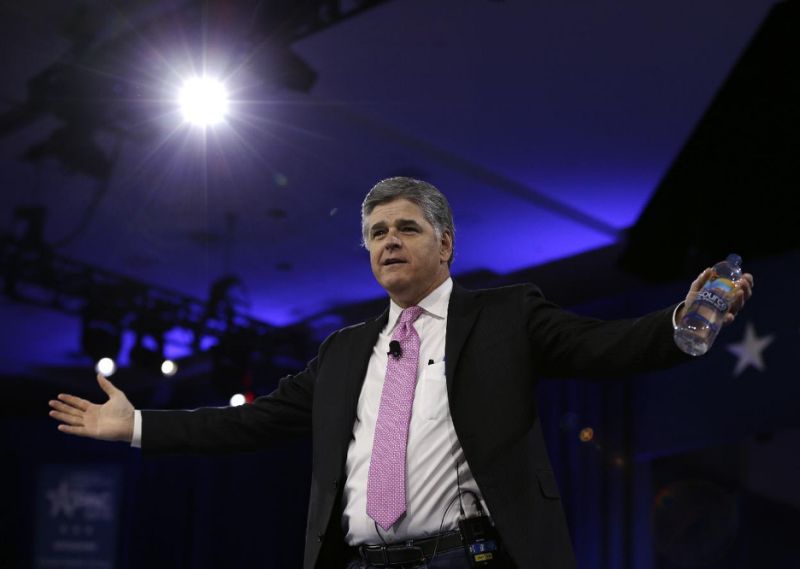
Sean Hannity is getting a bruising reminder that this year’s presidential campaign defies traditional political rules. The Fox News Channel and radio host had a nasty spat with Sen. Ted Cruz this past week, following criticism from both the left and right about his interviews with Donald Trump. Fox also aired the odd spectacle of Hannity sitting onstage with Trump as an audience booed lustily at the mention of Fox colleague Megyn Kelly‘s name. In an election year when cable news networks are enjoying a bump in viewership, Hannity is a key man for Fox, and his audience is growing more quickly than Kelly’s and Bill O’Reilly‘s. They precede Hannity in Fox’s prime-time lineup. Fox declined to make Hannity available for an interview for this story. Hannity’s relationship with Trump became an issue when the liberal website Thinkprogress.org published a story that wondered how Hannity had been able to interview Trump so much without making news, and quoted exchanges that depicted a friendly relationship. Trump had been a guest on Hannity’s Fox show 32 times before last week’s town hall in Pittsburgh, according to the host’s records. Hannity has said on his radio show that he does not support one Republican over another. The attack didn’t seem to surprise Hannity, who noted the website’s ties to Hillary Clinton supporters. The story, however, was picked up and amplified by the conservative, anti-Trump website Redstate.com. During Hannity’s recent Trump interview, he pressed for specifics on how the candidate would help people economically in that part of the country and how his Mideast policies would differ from President Barack Obama‘s. About Trump’s claims that some delegates were being snatched, Hannity said, “Clearly there are people who want to circumvent and disenfranchise the voters. What do you say to them?” He asked him to detail Clinton’s weaknesses, and there was an uncomfortable moment where he asked Trump to reveal what unflattering nickname he would try to stick on Clinton like he did with “Lyin’ Ted” Cruz. Trump wouldn’t say, but promised Hannity he’d be the first to know. By Hannity’s count, Cruz had appeared on his television show 34 times since Cruz announced his candidacy. Ohio Gov. John Kasich, still in the race, and Kentucky Sen. Rand Paul, who is not, had been on the show 20 times, with Florida Sen. Marco Rubio, another dropout, making 19 appearances. On his radio show, through last week, Cruz had logged more interview time than any other candidate — more than 188 minutes on the air. Trump’s 112 minutes were third behind Rubio. “I’m just going to remain neutral and give you access to the candidates, because no one else is doing it,” Hannity said. “At the end of the day, if it’s Cruz or Trump who is the nominee, I’m going to support them because it would be a disaster if Hillary Clinton becomes president.” When Cruz this past week seemingly made a reference to Hannity’s critics in a radio interview, the host flashed annoyance. After Cruz called a Hannity question about the fight for delegates part of a silly media obsession, Hannity pressed the point. “The only people asking this are the hard-core Donald Trump supporters,” Cruz said. “You’ve got to stop,” Hannity replied. “Every time I have you on the air and I ask you a legitimate question, you throw this in my face, and I’m getting sick of it. I’ve had you on the air more than any other candidate.” The unabashed conservative makes no secret of his views, and he appeals to a like-minded audience. In last week’s Trump interview, when Hannity asked about the candidate’s private meeting at Trump Tower with Kelly on April 13, the pro-Trump crowd booed at the mention of her name. Kelly has come under constant criticism from Trump since she asked him a question he didn’t like last summer. Neither man spoke about the audience’s reaction. Trump smiled. Hannity, who was largely off camera, appeared to make a “stop” motion with his arms. It was an audible manifestation of a delicate problem for Fox. Kelly, Fox’s brightest new star, has come under relentless criticism from Trump, and many Hannity fans are siding with the GOP front-runner instead of the network long loved by Republican viewers. Given that Trump seems to feel comfortable on Hannity’s show, the veteran talk show host is an important asset for Fox in a combustible campaign. Republished with permission of the Associated Press.
US to States: Make it easier for ex-prisoners to obtain IDs, vote
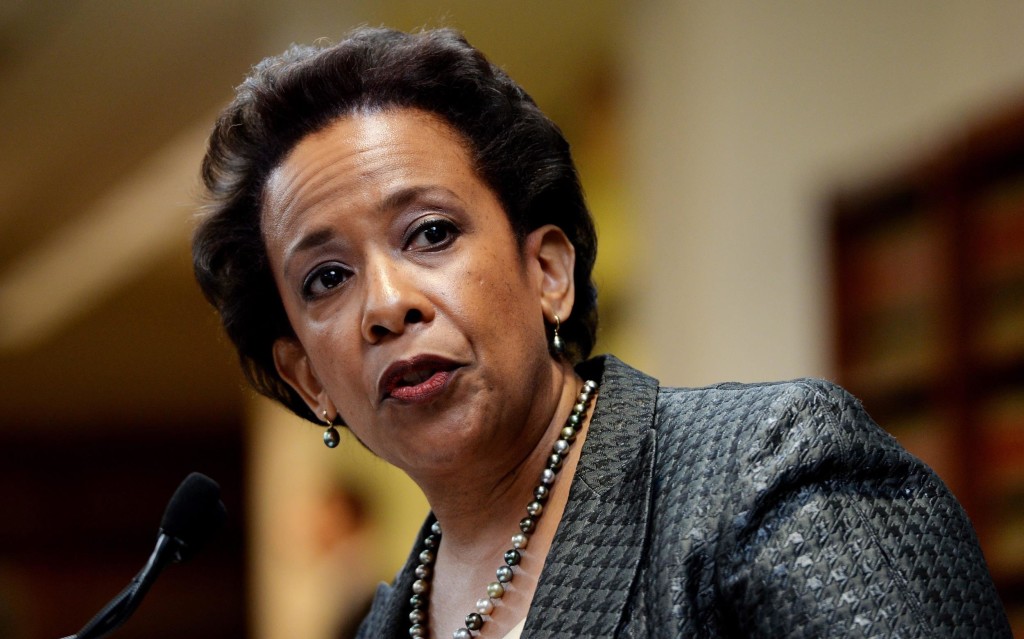
Attorney General Loretta Lynch is urging the nation’s governors to make it easier for convicted felons to obtain state-issued identification after they get out of prison, part of a broader plan being announced Monday to help smooth the path for state and federal inmates who are preparing to re-enter society. The announcement, on the first day of National Reentry Week, is aimed at helping the roughly 600,000 state and federal prisoners who return each year to American neighborhoods to better acclimate to society and remove some of the hurdles ex-convicts face in getting jobs, education and housing. “The long-term impact of a criminal record prevents many people from obtaining employment, housing, higher education and credit-and these barriers affect returning individuals even if they have turned their lives around and are unlikely to reoffend,” Lynch said in a seven-page policy titled “Roadmap to Reentry.” She planned to announce the policy change at an appearance in Philadelphia on Monday afternoon. The Justice Department initiative directs the federal Bureau of Prisons to prepare an individualized re-entry plan for each inmate that will take into account substance abuse, criminal history and education level. In addition, the agency will be reviewing its network of halfway houses and assessing its life skills, education and job training programs to ensure that they’re best serving the needs of inmates. A pilot program is also being launched at four BOP facilities for children of incarcerated parents. Lynch is separately calling on governors to allow federal inmates who are returning to their communities to exchange their prisoner identification card for state-issued identification, or to simply accept their BOP card as an identity document. Without identity documents, Americans leaving prison face challenges in getting jobs, housing or opening bank accounts, Lynch wrote in a sample letter to Alabama Gov. Robert Bentley. The topic of prisoner re-entry has attracted growing attention on the state and federal level. Last week, Virginia Gov. Terry McAuliffe issued an executive order that would allow more than 200,000 convicted felons to cast ballots in November. Republished with permission of The Associated Press.
In Donald Trump, Alabama Senator Jeff Sessions finds political kindred spirit
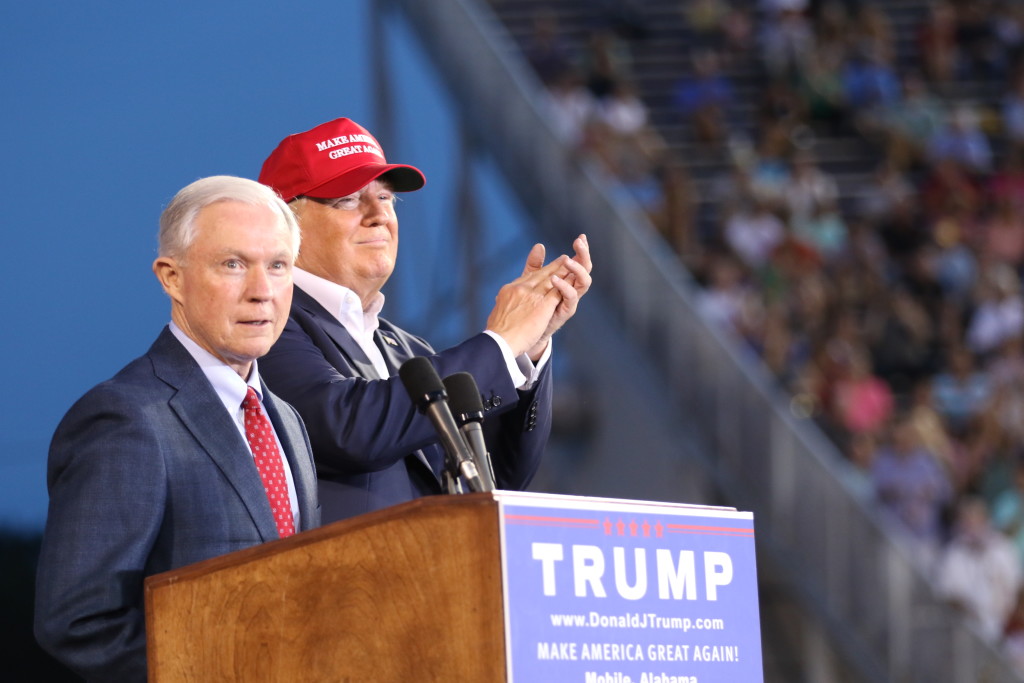
Donald Trump and Alabama Sen. Jeff Sessions would seem to have little in common. Sessions is a polite Southerner from small-town Alabama, while Trump is a brash New Yorker and creature of the big-city spotlight. Sessions likes to spend weekends out of cellphone range in a rural corner of his home state. Trump retreats to his lavish Mar-a-Lago compound where he’s easily accessible on social media or for a television appearance. Yet the two have become kindred political spirits in the 2016 election, drawn together by a shared belief that some of their Republican Party leaders are selling out their own voters on immigration, as well as on trade. It’s an argument Sessions has made for years in relative obscurity and one Trump has ridden to the top of the Republican presidential primary field. “I do think the Republican Party needs to recognize that it is in danger of promoting an agenda that’s contrary to the wishes of its own voters,” Sessions said. “This can be a death blow.” As the first – and to this point, only – senator to endorse Trump, Sessions has taken on the role as Washington gatekeeper for the GOP front-runner. He’s assembled the candidate’s foreign policy leadership team and sends other experts Trump’s way. When Trump name-drops Sessions on the campaign trail, it elicits cheers from crowds who have come to see his endorsement as affirmation of their candidate’s hard line on immigration. “When it came to immigration, which is a very big issue for me, and trade, which is an enormous issue for me, I felt he’s the most respected person in Washington,” Trump said of Sessions during an interview with The Associated Press. It’s an unlikely turn in the political spotlight for the 69-year-old Sessions, who has hardly been viewed as a man of significant political influence during his nearly 20 years representing Alabama in the Senate. He’s the longest-serving Republican in the Senate without a committee chairmanship or leadership post. And he’s increasingly been out of step with his party’s leaders on major issues, including his staunch opposition to the sweeping Trans-Pacific Partnership trade agreement. If Sessions has been known for anything outside of his home state in recent years, it’s been as the target of immigration advocates, who have branded him a nativist for his support of tough enforcement policies and limiting legal immigration. He was instrumental in derailing President George W. Bush‘s attempts at immigration overhauls and was a leading opponent of the 2013 “Gang of Eight” bill that passed in the Senate but was blocked in the House. “He’s the most ardent, anti-immigrant restrictionist that you can find,” said Frank Sharry, executive director of the pro-immigration group America’s Voice. “He comes from the kick-them-out-and-keep-them-out camp.” Sessions sees Trump’s rise as validation of his belief that Republicans’ political success depends not on expanding its appeal with the fast-growing Hispanic voting bloc, but on siding with working-class voters who view job competition from immigrants and trade agreements as a threat to their own economic security. The senator dismisses the notion that he and Trump’s views are geared only toward white voters, saying he’s “morally” confident that he’s aligned with Hispanics and African-Americans as much as anyone else. “You bring in more labor, you’re competing directly with them,” Sessions said of minorities. Despite their shared political philosophy, the senator’s endorsement didn’t come easy for Trump. Sessions had met the billionaire only once, when the real estate mogul testified at a 2005 Senate hearing on funding for a United Nations renovation project. But shortly after announcing his candidacy, Trump began courting Sessions’ support and seeking policy guidance from the senator’s staff. The two men also began speaking by phone. In September, they held a 90-minute meeting at Session’s hideaway office on Capitol Hill, where Trump told the senator flatly that he was in the race to win it. In January, trusted Sessions’ aide Stephen Miller left Capitol Hill to serve as a senior policy adviser to Trump. Sessions grew fond of Trump but resisted endorsing him. Sessions had never publicly backed a candidate in a GOP primary before and preferred to make the case for his views through data-driven policy papers. It’s not unusual for his aides to distribute lengthy documents to Senate offices, or for Sessions himself to push materials into a colleague’s hand. A turning point came in January, when the senator joined other lawmakers and prominent conservatives at a private retreat in Sea Island, Georgia. The exclusive gathering was held just a few weeks before primary voting began, as the reality that Trump’s candidacy wasn’t fading began to set in with many Republicans. Sessions became incensed as one high-profile speaker in particular railed against Trump, warning that he would be destructive for the party. Though Sessions wasn’t scheduled to speak, he stood up unexpectedly and berated his colleagues for being the ones putting the party’s future at risk by failing to fully understand their voters’ economic concerns. “I just felt like, we’ve got to battle for the heart and soul for the Republican Party,” Sessions said. “Are we going to reattach with the middle class, working Americans or are we going to continue to kowtow to the donor class?” About a month later, Sessions joined Trump on stage at a rally in Madison, Alabama, and announced his endorsement. Two days later, Trump won Sessions’ home state by more than 20 points. Sessions’ endorsement stunned some conservatives, who assumed that if he did back a candidate, it would be Texas Sen. Ted Cruz. But Sessions suggested he didn’t see his Senate colleague as a viable nominee, noting that his endorsement came after Trump defeated Cruz in the South Carolina primary. Trump often brags that legions of lawmakers and Washington powerbrokers are constantly reaching out to him. But he conceded that Sessions made him work for his support and needed to be sure the first-time politician was a true-believer on immigration and trade. “It wasn’t easy,” Trump said. “I put


